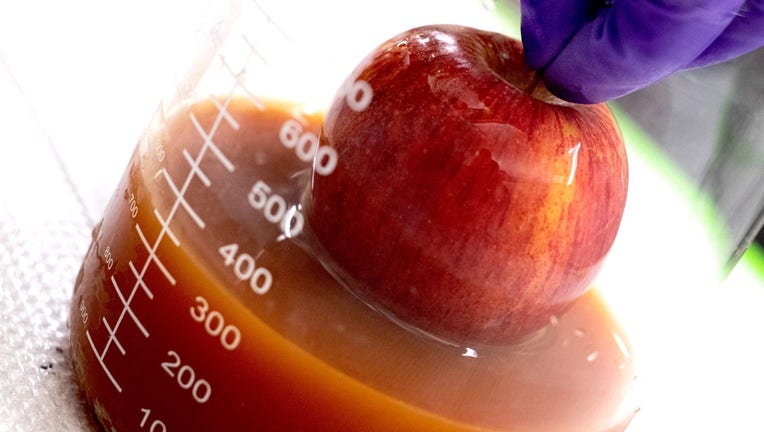Scientists create protective coating for fruit and veggies to make them last longer

A coating developed at Rice University made primarily with protein from eggs that would otherwise be wasted can be used to extend the freshness of produce. (Photo by Jeff Fitlow/Rice University)
HOUSTON - Do you wish the strawberries in your refrigerator would last just a few days longer? Researchers in Texas have developed a special, protein-based coating designed to extend the shelf life of fruits and vegetables.
Fruits and vegetables have the highest spoilage rates of all foods, according to scientists at Rice University in Houston, who developed the coating. In fact, more than half of all produce ends up in the trash, according to data shared by the U.S. Department of Agriculture.
The egg-based coating was developed by Rice University materials scientist Muhammad Rahman, who won a Partnerships for Innovation-Technology Translation award from the National Science Foundation for the project.
It reduces spoilage in produce, dehydration and microbial growth rates, Rahman said.
He added that the coating aims to address both food preservation and waste management challenges and could help improve access to fresh produce in "food deserts" – or areas with poor access to healthy and affordable foods.
"The goal of this project is to develop an eco-friendly, biodegradable, protein-based nanocomposite coating that can be applied to the surface of variously shaped fruits and vegetables," Rahman, an assistant research professor in materials science and nanoengineering, said in a statement.
The produce coating builds on earlier research from Rahman and others in 2020, which showed that the egg-based coating doubled the shelf life of avocados, bananas, and other fruit. The coating, made from surplus eggs, won Rahman and collaborator Pulickel Ajayan the Sustainable Technologies/Future Energy category in the 2021 Tech Briefs Create the Future competition.
The most recent award, which comes with a nearly $250,000 grant, will help move the produce coating project "from lab- to pilot-scale," Rahman said.
"Food-coating practices currently rely on waxes, and a protein-based coating could really be a game-changer," Rahman said.
Beyond extending the shelf life of consumers’ produce, the researchers said how it could have environmental benefits too. The Rice University team said nearly 220 pounds of food waste per person is produced each year, worth a total of $161 billion, citing USDA estimates from 2010.

National park shares impacts of food waste
Officials with Glacier National Park said tossed banana peels, apple cores and other food waste is likely to be eaten by wildlife and can encourage animals to go looking for it along roadways — putting them in danger.
Meanwhile, food loss and waste represents a significant source of greenhouse gas emissions too. A 2021 report published by the Environmental Protection Agency estimated that carbon dioxide emissions resulting from food loss and waste in the U.S. each year are the equivalent of roughly 18% of the amount of annual emissions from America’s coal-fired power plants.
"The broader hope for this project is to improve the food industry carbon footprint and sustainability," Rahman said. "I strive to align my research with the challenges of this critical, historic moment that confronts us with the urgent need to address anthropogenic climate change and find real-world solutions for a more sustainable future."
This story was reported from Cincinnati.

